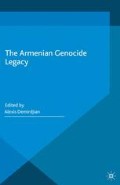Abstract
The annals of Turkish-Armenian ‘rapprochement’, ‘reconciliation’, ‘initiative’, and ‘dialogue’ marked 8 January 2011 as the day when Turkish Prime Minister Recep Tayyip Erdoğan called the Monument of ‘Humanity’ by Mehmet Aksoy in Kars a freak, protested that it overshadowed a nearby Islamic shrine, and ordered its demolition. Foreign Minister Ahmet Davutoğlu supported this position on aesthetic grounds:
Kars has an architectural tradition inherited from the Ottomans and the Seljuks. This monument does not reflect … these architectural aesthetics. Works in compliance with the architectural heritage of the region should be constructed.2
The author wishes to thank Burcu Gürsel and Marc Mamigonian for their questions, comments and editing of several versions, and Anna Mathew and Alexis Demirdjian for their assistance in reviewing and editing this chapter.
Access this chapter
Tax calculation will be finalised at checkout
Purchases are for personal use only
Preview
Unable to display preview. Download preview PDF.
Notes
S. L. McKinney (2011) ‘Narrating Genocide on the Streets of Kigali’, in M. Gegner and B. Ziino (eds) The Heritage of War ( London: Routledge ), pp. 160–76, See Chapter 14, Sensenig-Dabbous on ‘thanatourism’).
M. K. Smith (2009) Issues in Cultural Tourism Studies ( London: Taylor & Francis);
J. Struk (2004) Photographing the Holocaust: Interpretations of the Evidence ( London and New York: I. B. Tauris);
T. Cole (2000) Selling the Holocaust: From Auschwitz to Schindler; How History is Bought, Packaged and Sold ( London: Routledge); Gegner and Ziino (2011);
M. Sturken (2007) Tourists of History: Memory, Kitsch, and Consumerism from Oklahoma City to Ground Zero ( Durham: Duke University Press).
E. Mintaş (2012) Ucube, documentary, http://www.altinportakal.org.tr/en/film_detay/-149.html.
A. Tekiner (2014) Atatürk Heykelleri, Kült, Estetik, Siyaset (2nd edn.) (Istanbul: Iletişim Yayınları).
See, for example, I. Golomstock (2011) Totalitarian Art in the Soviet Union, the Third Reich, Fascist Italy and the People’s Republic of China ( London: Duckworth Overlook).
L. P. Koepnick (1999) Walter Benjamin and the Aesthetics of Power ( Lincoln: University of Nebraska Press ), p. 182.
P. Nora (1996) Realms of Memory ( New York: Columbia University Press).
P. Bourdieu (1981) ‘La représentation politique. Éléments pour une théorie du champ politique’, Actes de la Recherche en Sciences Sociales, Vols. 36–7: 3–24;
P. Bourdieu (1991) Language and Symbolic Power ( Cambridge, MA: Harvard University Press ), p. 171.
Author information
Authors and Affiliations
Editor information
Editors and Affiliations
Copyright information
© 2016 Ayda Erbal
About this chapter
Cite this chapter
Erbal, A. (2016). Lost in Translation: The Monument’s Deconstruction. In: Demirdjian, A. (eds) The Armenian Genocide Legacy. Palgrave Studies in the History of Genocide. Palgrave Macmillan, London. https://doi.org/10.1007/978-1-137-56163-3_14
Download citation
DOI: https://doi.org/10.1007/978-1-137-56163-3_14
Publisher Name: Palgrave Macmillan, London
Print ISBN: 978-1-349-57402-5
Online ISBN: 978-1-137-56163-3
eBook Packages: HistoryHistory (R0)

